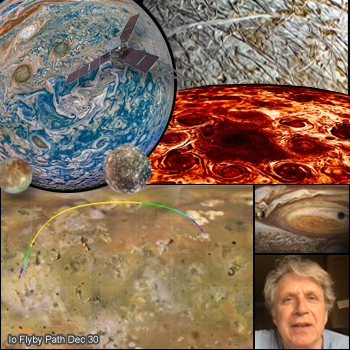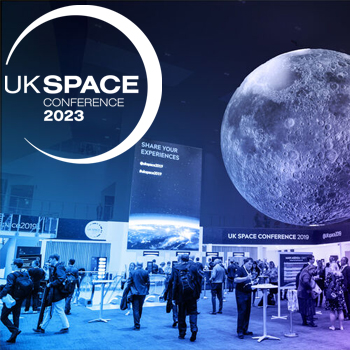Jupiter Solo Explorer Juno Ready for 56th Perijove Flyby and 2 More Years of Operations
Juno is heading into its next flyby of massive Jupiter on November 22, perijove #56, flying at speeds near 209,000 kph from north to south over the cloud tops in its highly elliptical polar orbit. Jupiter has 95 moons that are officially recognized by the International Astronomical Union, completes one day / rotation in ~10 hours, and is estimated to have 3 distinct cloud layers that span about 71 km. Juno has already captured unprecedented data on Galileo moons Europa and Ganymede, the Great Red Spot, southern storms, aurorae and atmosphere bands on Jupiter. The 57th perijove flyby, occurring December 30, is predicted to come within 1,500 km of moon Io. Since its orbital insertion around the gas giant on 4 July 2016, Juno has been sending data to the Deep Space Network, which has a maximum data capacity at 25 kilobytes per second. Juno will perform a total of 76 close flybys, one every 38 days, until its planned September 2025 atmosphere impact. One month before the controlled impact, the ESA Jupiter Icy Moons Explorer (JUICE) spacecraft will be making a flyby / gravity assist maneuver at Venus on trajectory for Jupiter orbit insertion in July 2031. (Pictured: Juno PI Scott Bolton; Image Credits: NASA, SwRI, JPL-Caltech, ASI, INAF, JIRAM)
|
MONDAY☆ Nov 20 — International Space Station, ~415-km LEO: Expedition 70 seven-member crew working with experiment to study how animal cells sense gravity, setting up laptop for ILLUMA-T to test data transfer speeds ≤1.24Gbps, transferring cargo from Dragon CRS-29, Cygnus-19, Progress 85P. ☆ Nov 20 — Tiangong Space Station, ~390-km LEO: China considering expanding station to include 3 more modules which would allow for additional crew and internal & external experiment payloads hosting. Highlights… o NewSpace: OrienSpace of Shandong, China targeting December sea launch of Gravity-1 rocket from Haiyang spaceport; Impulse Space inaugural OTV mission Mira LEO Express 1 operating nominally; QuantumNet cislunar constellation precursor Scout-1 Sentry mission to launch NET March 2024. ☆ Solar System: NASA Mars Sample Return program on hold as officials review budget feasibility; UCSC-led study calculates tidal locking of dwarf planet Eris and its satellite Dysnomia indicates icy shell / rocky interior. ☆ Galaxy: CALorimetric Electron Telescope indicates local origin of cosmic rays, instrument to continue operating until ISS decommissioning; SETI Institute mission to find life in universe supported by $200M donation from estate of Qualcomm founder; Study led by Caltech astronomer Jessie Christiansen of sub-Neptune exoplanets in Praesepe and Hyades clusters suggests size limited by core processes. o Global: 26 space companies including Digantara of India urge adherence to UN resolution banning direct ASAT testing; LVM3 upper stage from Chandrayaan-3 now thought to be resting in North Pacific ocean following uncontrolled reentry; SIRIUS long-term space analog investigating reproductive health in conjunction with Asgardia Space Nation. ● USA: White House plan for novel space mission regulation would share responsibility between departments of Commerce and Transportation; Project Kuiper prototypes functioning nominally in LEO, Amazon to begin production run in Dec; Jim Free to be promoted to associate administrator, third highest NASA executive after Pam Melroy, Bill Nelson. ● Hawai’i: Privateer of Maui teaming with Lumi Space to integrate retroreflectors on Pono satellite trackers; Subaru Telescope advancing understanding of cosmic-ray air showers with Hyper Suprime-Cam. |
 |
● = Terrestrial and… o = International terrestrial events
☾ = Moon activity ★ = Space and… ☆ = International space / astro events in Hawaii Standard Time unless noted. Add 10 hours to obtain UT (‘Universal Time’). |
Weekly Planet Watch – Evening Planets: Jupiter (E), Saturn (S), Uranus (E), Neptune (SE); Morning Planets: Venus (ESE).
Future is Focus of 2023 UK Space Conference
|
★ Nov 20 — Swift, LEO: Observing gamma-ray bursts & their afterglows in gamma-ray, X-ray, ultraviolet, optical wavelengths from LEO, multiwavelength craft reaches 19 full years / begins 20th year of operations in space today, launched in 2004. ☾ Nov 20 — Moon: At first quarter, 00:50; 2.51° SE of Saturn, 07:00. ☆ Nov 20 — Apollo Asteroid 2023 VE4: Near-Earth Flyby (0.034 AU). Ongoing… ☾ Sep 6 – NET Jan/March — Smart Lander for Investigating Moon (SLIM), Lunar Landing Trajectory: SLIM Moon mission 4-6 month trajectory to soft land east of Shioli crater (13.2°S, 25.2°E) on Moon near side equatorial region. ☆ Sep 6 – NET Mar — X-Ray Imaging and Spectroscopy Mission (XRISM), ~550-km LEO: XRISM undergoing 6 month check out testing phase before start of science operations to study galactic plasma. TUESDAYo Nov 21-23 — UK Space Agency, Belfast, Northern Ireland, United Kingdom: UK Space Conference 2023. ☾ Nov 21 — Moon: At perigee (distance 369,805 km), 11:16. WEDNESDAY★ Nov 22 — Juno, Perijove 56 / 55th Science Flyby, Jupiter Orbit: NASA craft to perform Jupiter flyby during Perijove 56, its 56th close flyby of Jupiter and 55th science flyby with instruments turned on. ☾ Nov 22 — Moon: 1.34° SE of Neptune, 00:00. THURSDAYo Nov 23-25 — China Association for Science and Technology, Chinese Academy of Science, Chinese Academy of Engineering, UNESCO, International Science Council, World Federation of Engineering Organizations, Shenzhen, China: Fifth World Science and Technology Development Forum 2023: Empowering Development through Science and Technology, Shaping the Future of the Greater Bay Area. ☆ Nov 23 — Apollo Asteroid 2023 VH6: Near-Earth Flyby (0.017 AU). |
FRIDAY
● Nov 24-27 — Kennedy Space Center Visitor Complex, KSC FL: Meet Astronaut Mike Foreman.
☆ Nov 24 — Apollo Asteroid 2019 UT6: Near-Earth Flyby (0.023 AU).
SATURDAY
o Nov 25 — Gemini South, NOIRLab, Mt. Cerro Tololo, Chile: Public Visits to Gemini Observatory atop Mt. Cerro Tololo; 42 people per tour.
☾ Nov 25 — Moon: 2.56° NNW of Jupiter, 00:00; 2.59° NNW of Uranus, 22:00.
☆ Nov 25 — Apollo Asteroid 2019 CZ2: Near-Earth Flyby (0.007 AU).
SUNDAY
☾ Nov 26 — Moon: 1.08° SE of Pleiades, 16:00; Full Beaver Moon, 23:15.
☆ Nov 26 — Apollo Asteroid 2023 VM1: Near-Earth Flyby (0.027 AU).

